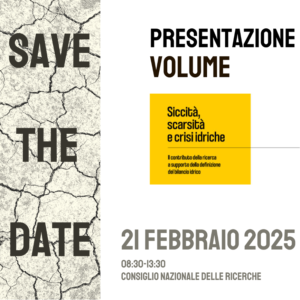
Established in July 2023 by the Department of Earth System Sciences and Environmental Technologies of the CNR, the working group “Droughts, scarcity and water crises” is made up of 11 researchers from numerous CNR institutes.
Sustainable management of water resources, the vulnerability of supply systems to drought conditions and measures to mitigate water crises represent one of the main critical issues of our society and are a subject of debate and attention in the civil, political and economic world.
The ongoing climate changes are modifying the hydrological and hydrogeological regimes with negative impacts on the availability of water resources and ecosystem services, exacerbating a condition of structural fragility of the Italian water systems to drought events, with important repercussions also on water quality. The recurring occurrence of such phenomena highlights the need for adequate scientific investigations of the meteorological-climatic, hydrological and hydrogeological processes related to it, as well as of the impacts of current and future climate variability on ecosystem services, biodiversity and water supply and distribution systems. The associated research questions must be inserted in a broad context of sustainable management of water resources that scientifically supports the necessary planning of specific and structural interventions in the medium-long term aimed at increasing the resilience of supply systems, which at the same time allow the maintenance and, where necessary, the restoration of ecosystem services.
The aim of the Working Group “Drought, Scarcity and Water Crises” is therefore to stimulate and promote synergies between the multiple activities of the DSSTTA relating to the sustainable management of water resources and the management of water crises, with the aim of assessing, in a context of climate change, the vulnerability and resilience to drought events of supply systems as an integral part of overall ecosystem services. The “system” perspective is pursued through an integrated approach that takes into account:
- the improvement of meteorological-climatic, hydrological and hydrogeological monitoring systems for the quantification of the state of water resources, including those deriving from the cryosphere, using integrated ground and satellite measurements;
- improving the reliability of future climate scenarios and the related impact modelling on water resources; improving the medium-term weather forecasting capacity and the related scenarios on resource availability from an early warning perspective;
- the quantification of both the glacial contribution to valley floor flows as a function of the spatial scale of the river basin and of the buffer effect especially with respect to drought events;
- the quantification of available groundwater and its interactions with surface water bodies, through geophysical, sequence stratigraphy and hydro-stratigraphy methods;
- the study of the relationships between the quantity and overall quality of water bodies;
- the development of multifunctional, innovative and resilient ecohydrological strategies, with high efficiency of water capture and use in the primary sector of agriculture and forestry, based on observations, data analysis, field experiments and numerical modelling of the water-soil-vegetation system;
- the restoration and protection of ecosystems through the maintenance or improvement of their overall ecological state, with the consequent improvement of environmental quality and of the resources and ecosystem services offered;
- development and support for the implementation of technologies aimed at reusing resources and saving water;
- identification of alternative supply sources and partially utilized sources through the development of comparative assessment tools of different risk management and mitigation strategies;
- increasing the efficiency of resource supply and distribution systems;
- the identification of economic/financial instruments for support and compensation in crisis situations and for the adjustment of tariff structures that incentivize non-conventional sources (reuse of waste water); the improvement of current water resources governance systems that leads to overcoming the current fragmentation of competences (Integrated Water Service managers, reservoir managers, land reclamation and irrigation consortia, agencies, territorial bodies, etc.) and institutional fragmentation.
Contacts and Initiatives
For information or proposals you can write to us at the email address gdl-siccita@cnr.it
Objectives
The Working Group “Drought, Scarcity and Water Crisis” aims to systematize the most recent scientific and technological knowledge and the experience gained by the CNR institutes involved in the monitoring and management of drought events for the creation of an organic knowledge framework potentially in operational support of water governance in Italy and in particular within the Permanent Observatories for Water Use. This systematization will be able to provide elements for:
- Estimation of current and projected water balances within the broader framework of maintaining and where necessary restoring ecosystem services.
- Predicting and managing water crises.
- The diffusion of a “risk culture” in relation to drought events.
Events, workshops and reports

On February 21, 2025, the presentation of the volume “Droughts, scarcity and water crises. The contribution of research to support the definition of the water balance” edited by Emanuele Romano and Ivan Portoghese (CNR-IRSA) and published by CNR Edizioni will be held at the CNR Conference Hall, in Piazzale Aldo Moro in Rome.
How to participate
The event is open to the public, with the possibility of participating both in person and remotely (following the CNR streaming).
- Registration to attend the event in person: [https://eventi .irsa.cnr.it/e/volumesiccita]
- Live streaming: Link https://live.cnr.it/liveRomaConvegni.html
- Free online download of the volume:[https://www .cnr.it/sites/default/files/public/media/attivita/editoria/SiccitaInterattivo_ver2.pdf]
- Program
Participants
WG components:
Coordinator: Dr. Emanuele Romano (IRSA)
Vice-Coordinator: Dr. Ivan Portoghese (IRSA)
Components:
Dr. Luca Brocca (IRPI)
Dr. Marco Lauteri (IRET)
Dr.ssa Matia Menichini (IGG)
Dr. Fabrizio De Blasi (ISP)
Dr.ssa Cristina Di Salvo (IGAG)
Dr.ssa Maria Adamo (IIA)
Dr. Stefano Federico (ISAC)
Dr. Vito Imbrenda (IMAA)
Dr. Claudio Pellegrini (ISMAR)
Dr.ssa Domenica Mosca Angelucci (IRSA)
Dr. Christian Ferrarin (ISMAR)
Dr. Fabrizio Stefani (IRSA)
Technical-scientific secretariat: Dr.ssa Maria Elena Martinotti (DSSTTA)
